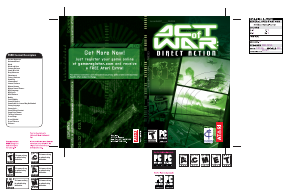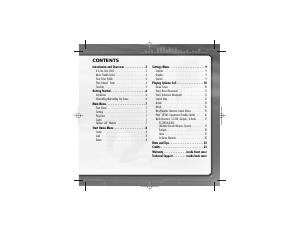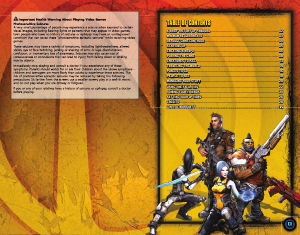
Game Set-Up Screen
Launch: Start the game. (This button is only avail-
able for the player creating the game. Players
joining a game will see a “Ready” button.)
Cancel: Return to the previous menu.
Opponent: You can select an open slot and
choose an AI-controlled player, or close the slot
to other players. You can set the difficulty level for
any AI-controlled players you add.
Color: Choose the color for each player.
Side: Select which of the three sides to play – Task Force Talon, U.S. Army or the Consortium.
Team: Choose teams for each player – players on the same team will not automatically
attack each other.
Select Theater: If you created the game, you have the option to select on which map to play.
10
Stop
Continued from page 10
Eventually, though, they leveled out.
The international community worked
together to resolve the crisis. Within a
few short years, the ‘70’s crisis was a dis-
tant memory, and Americans quickly
returned to their expansive way of life.
Today, no such solution seems likely –
or even possible. Prices continue to
climb, and there’s no end in sight.
The crisis is having a ripple effect
across all sectors of the economy.
Trucking companies can’t afford to send
their fleet out as often as they once did.
That, in turn, is limiting the flow of
goods to retail stores, especially big-box
stores like Costco and Sam’s Club.
Perishable goods in particular, like pro-
duce, are impacted by the change.
Business owners say they have no choice
but to pass the cost increase on to their
customers. That would explain why red
peppers are now selling for an average of
$8 a pound.
To accommodate this new reality,
Americans are making some serious
changes to their lifestyles and spending
patterns. Summer car trips are a thing of
the past. People have cut back dramati-
cally on their household expenses. Gone
are the weekend movies and impulse
purchases. Couples like Scott and Kristin
Laing of San Diego no longer treat them-
selves to ‘date night’ away from their
two young sons, Jake and Elroy. “We
can’t even afford the babysitter, much
less the dinner tab!” says Scott.
Anecdotal stories like these are backed
up by government statistics. The Federal
Reserve reports that discretionary spend-
ing is down 42% in the last 12 months.
Analysts worry that this dramatic drop
in consumer spending will send the
American economy, already in a precari-
ous position, into a tailspin from which it
may never recover.
Other observers are more optimistic.
Environmentalists, in particular, see a
large silver lining to today’s black cloud.
With fewer vehicles on the road, less
harmful pollutants are entering the
atmosphere. Some consumers are mak-
ing the switch to electric cars. Lailee
Mendelson, a spokeswoman for Honda,
says the auto company has seen a huge
spike in consumer interest for their
hybrid vehicles.
More importantly, some say,
Americans are changing some long-
standing – and, some say, destructive –
habits. Carpooling is back in vogue. So is
public transportation. Washington DC’s
metro system has seen a 73% jump in
occupancy in the last six months. Buses
are filled to capacity during peak hours.
And bicycle sales are at an all-time high.
Some people, like Brad Miller of
Atlanta, GA, see an added benefit to his
new lifestyle. He now uses his bike to
commute to work, a 15-mile round trip
he makes each workday. And he’s lost 10
pounds since June. “How about that?” he
says. “I never lost that much weight
when I worked out at the gym!”
Mr. Miller no longer belongs to his
neighborhood gym. He can’t afford it.
These days, Allison McCabe of Dallas
can’t believe her eyes.
“Is this thing broken?” she asks, tap-
ping the gas gauge at the pump. “That
can’t be right.”
But it is: the total comes to $147. And
that’s for one tank of gas.
Allison shakes her head and laughs.
“At this rate, my car’s going to cost me
more than my mortgage!”
Americans across the country are fac-
ing the same shocking news at the pump
– and they aren’t laughing. The price of
gasoline continues to skyrocket. Drivers
sit in their cars for hours, waiting for to
fill up their tanks – and that’s on days
when they can even buy gas; 65% of gas
stations report that their tanks have run
dry at least once in the past week.
No doubt about it, America is facing
the worst energy crisis it’s seen since the
1970’s. And those really were the good
old days. During the Carter administra-
tion, prices did rise dramatically.
See Stop page 11
Make It Stop!
Gas crisis rages on
Extreme gas prices are just one symptom
of the current crisis – costs have risen
drastically for most other necessities.
11
AOW_MBManInt 02.02.05 11:19 AM Page 10












Join the conversation about this product
Here you can share what you think about the PC Act of War - Direct Action. If you have a question, first carefully read the manual. Requesting a manual can be done by using our contact form.